After highlighting the 50 best films you may have missed this year and our overall top 50 films of 2024, today we put our spotlight on those that still need a home: movies we loved on the festival circuit––from Berlinale, Sundance, Cannes, TIFF, NYFF, Rotterdam, and beyond—still seeking U.S. distribution.
We hope that highlighting these titles spurs some distributor interest and a forthcoming release; we’ll be sharing any updates in this regard in on social media, so make sure to follow us. As we move into 2025, one can also track our upcoming festival coverage here.
Afternoons of Solitude (Albert Serra)

Following up his career-best work with the mesmerizing Pacifiction, Albert Serra is back just a couple years later, this time with a work of non-fiction. Afternoons of Solitude is a mesmerizing portrait of bullfighting star Andrés Roca Rey, set over just a handful of extended sequences in which we bear witness to the primal connection made between man and animal. Donning his majestic traje de luces (aka suit of lights), Rey’s all-consuming time in the ring is filmed with both a nervous calm and a sense of transfixing beauty as his blood-splattered matador costume starts to blend with the striking red ring he’s confined to. With Serra’s formal conviction, what could have been a standard documentary on the process becomes something altogether transcendent. – Jordan R.
The Adamant Girl (P. S. Vinothraj)

While rural stories have become a topic du jour across the many industries within Indian cinema, P.S. Vinothraj has carved a unique place for himself with Koozhangal (Pebbles) and his follow-up Kottukkaali (The Adamant Girl). He structurally breaks down family and community dynamics in rural areas with disquieting observation, his camera constantly tracking and intersecting movements of events. There are explosions of dialogue and emotion wrapped around long sequences of contemplation where just a glance can prove revelatory. Both Soori and Anna Ben, two well-established performers in Tamil cinema, are perfect ciphers for gender dynamics at play. Vinothraj refreshingly eludes sermons or obvious pleas, and The Adamant Girl respects its audience enough to let them unpack what they’re watching on their own time. – Soham G.
bluish (Lilith Kraxner, Milena Czernovsky)

I’ve loved few movies this decade as much as Lilith Kraxner and Milena Czernovsky’s Beatrix, which went largely undistributed in the United States (save a necessary streaming engagement from Le Cinéma Club). Their second feature, bluish, debuted to strong notices this fall, but even a New York Film Festival engagement was in the experimental Currents sidebar, guaranteeing underexposure for a film far more open, generous, and (frankly) accessible than that programming suggests. Hence its placement here instead of a rightful spot on our year-end celebration. Where Beatrix was country, bluish is town––for all the urban alienation that implies––and if less of a revelation it still achieves much new: art-world parodies, the terrible socializing done at gallery openings, probably the best manipulation of Zoom I’ve seen in any movie, what it feels like buying a big TV. Further credit to Kraxner and Czernovsky for proving themselves masters of the once-deployed needledrop. – Nick N.
Cloud and Serpent’s Path (Kiyoshi Kurosawa)

We might not be quite into late-period Kurosawa just yet, but after four decades behind the camera there are already signs of that same lack of fuss to his filmmaking. Just watch the opening sequence of Cloud, which delivers a full psychological profile of the film’s protagonist before even a title card appears. This sequence sees our dubiously motivated reseller flip a haul of medical equipment: ruthlessly haggling the seller down; meticulously setting up the listing; and then the anxious wait, first as he hovers over the sale price and then watching from afar as the products get snapped up, one by one; letting out a small, haunting sigh of ecstasy as the final item turns from white to red. – Rory O. (full review)
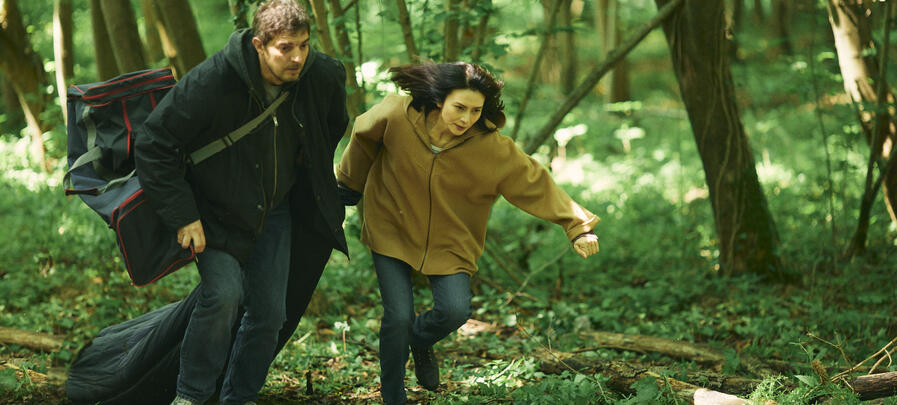
Remaking his own 1998 film, Kiyoshi Kurosawa gives Serpent’s Path a menacingly polished sheen. Rather than feeling like a B-movie, it’s a slow, stately crawl through warehouses turned into torture chambers, as Albert (Damien Bonnard) and Sayoko (Ko Shibasaki) seek to avenge a ring of wealthy child-traffickers who kidnapped and killed their daughters. Setting the story in France rather than the original Japan, he sticks to a few locations and turns the emotional volume way down, creating a chilling vision of manipulation and affect-less violence. – Steve E.
DIRECT ACTION (Guillaume Cailleau and Ben Russell)
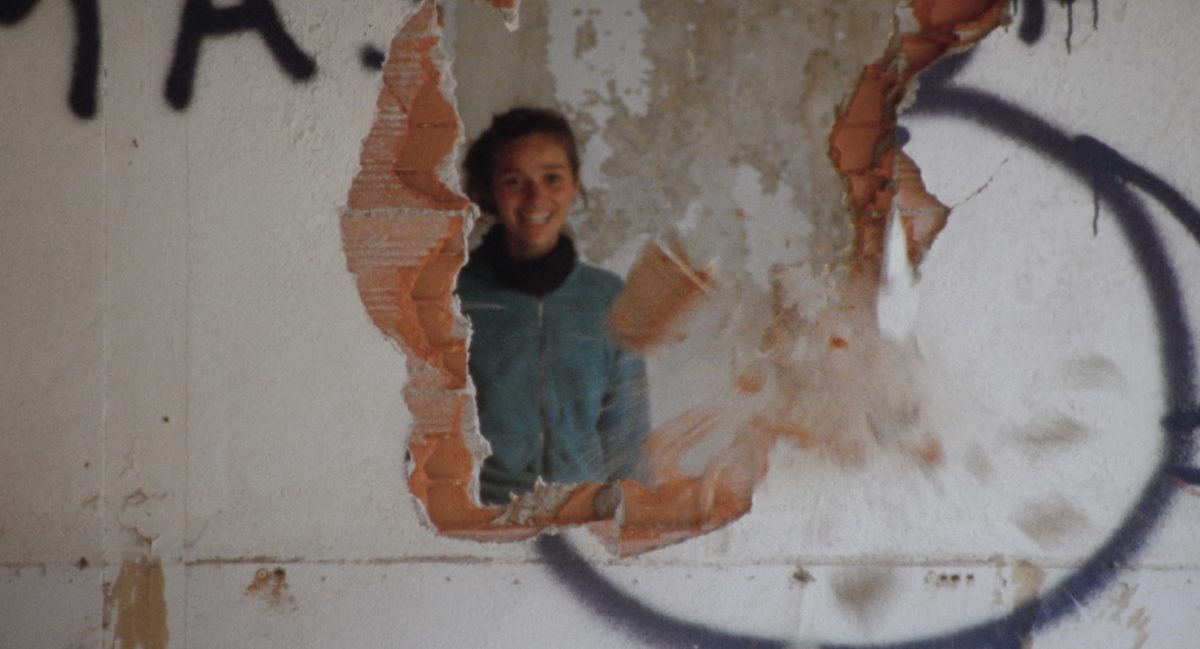
There’s a stretch of land in northwestern France that’s spent the past six decades fighting prospects of total annihilation. Plans to build a new international airport began to hover above Notre-Dame-des-Landes, a rural commune a few miles from Nantes, as early as the 1960s. In the years since, evicted farmers refused to leave and joined forces to squat their old turf back. Thus began the ZAD (Zone to Defend) as local residents and activists turned the reclaimed area into a self-sufficient community. “The airport will happen,” then-PM Jean-Marc Ayrault brayed in 2012. It didn’t. Governments from both left and right sought to remove the squatters, sometimes with astonishing force––during a large eviction campaign that spanned a couple of weeks in April 2018, the police fired an estimated 8000 tear gas canisters and 3000 stun grenades a day. Yet the ZAD prevailed, cementing itself as a successful example of collective living––a 21st-century heterotopia, if you will––that’s received as much attention from the cops as it has from the media. Journalists and filmmakers have been struggling to illuminate its inner workings ever since it came to life, spawning a canon of shorts, docs, and TV exposés that have treaded a dangerous line between voyeurism and cheap spectacle. In a place so flooded with images, what’s there left to show, and how? – Leonardo G. (full review)
Dreams in Nightmares (Shatara Michelle Ford)

Shatara Michelle Ford’s sophomore feature Dreams in Nightmares is a Black road trip film with a big heart, full of warmth, healing, and beauty. With their debut film Test Pattern, Ford announced themselves as an essential new voice in Black cinema, with a focus on the lives and struggles of Black women. Here, Ford tackles similar themes with a wider scope that includes Black femmes, queer love, and non-monogamous relationship structures. An even mix of comedy and drama, Dreams in Nightmares is a work that feels both casual and cathartic. – Jourdain S. (full review)
exergue – on documenta 14 (Dimitris Athiridis)
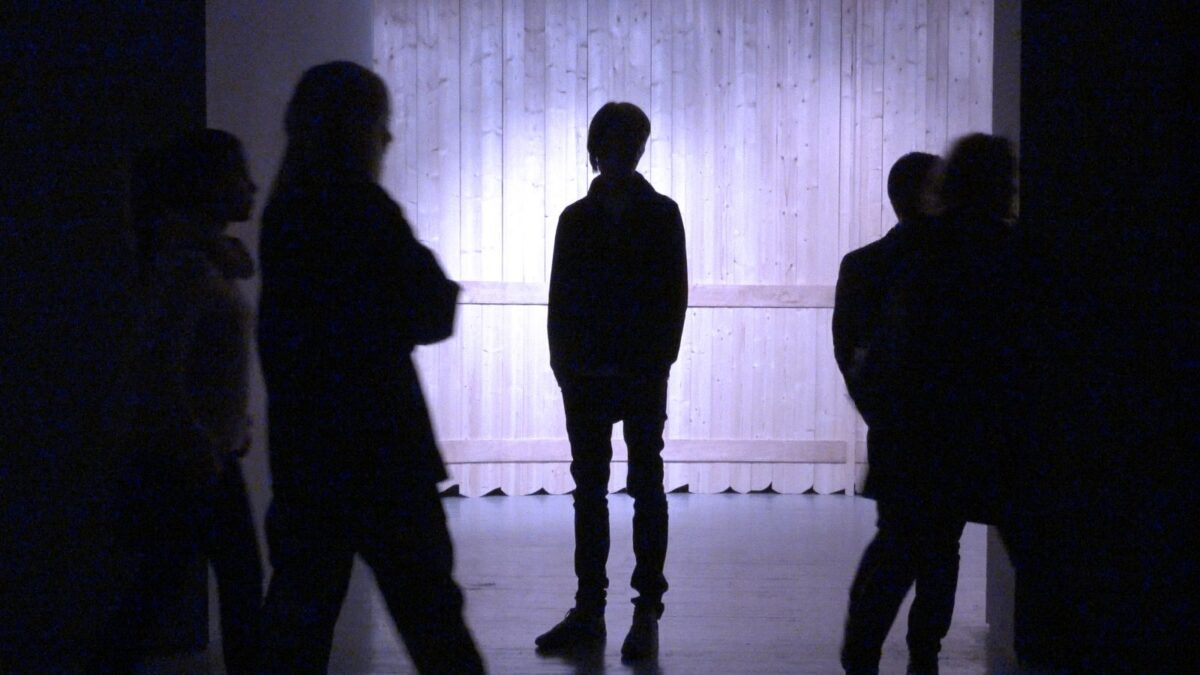
A fourteen-hour documentary about mounting an art exhibition can seem like a daunting viewing proposition, but fear not: Dimitris Athiridis’ exergue – on documenta 14 is the single most entertaining and gripping feature I saw out of 60-plus titles in this year’s New York Film Festival. In what should be required viewing for anyone interested in the systems of arts, commerce, and curation, the episodic endeavor follows documenta 14 artistic director Adam Szymczyk as he weighs questions of financial responsibility, the path of scouring the world for compelling art, marketing to an audience he hopes will return, and dealing with crises of the day. Deeply embedded in the mammoth project every step of the way, Athiridis’ Wiseman-esque approach to dissecting every element of the process is monumental in and of itself. – Jordan R.
Filmlovers! (Arnaud Desplechin)

For his tenth Cannes feature premiere, Arnaud Desplechin chose to present a docu-fictional love letter to cinema. Two years after Brother and Sister was in Competition, Spectateurs (or Filmlovers!) is one of the festival’s Special Screenings, an effervescent walk down memory lane with a director who has helped shape contemporary French cinema for the better. It’s not hard for a Frenchman to be a cinephile––almost everyone is trained in film knowledge, either formally or informally, as part of their cultural upbringing. But Filmlovers! manages to set itself apart from all the other meta-documentaries or essays about how cinema made their director the person they are today. Instead it is both an honest and highly poetic feature that quite naturally absorbs film and literary references to address the structural role cinema has played for both Desplechin himself and our way of viewing the world. – Savina P. (full review)
Harvest (Athina Rachel Tsangari)
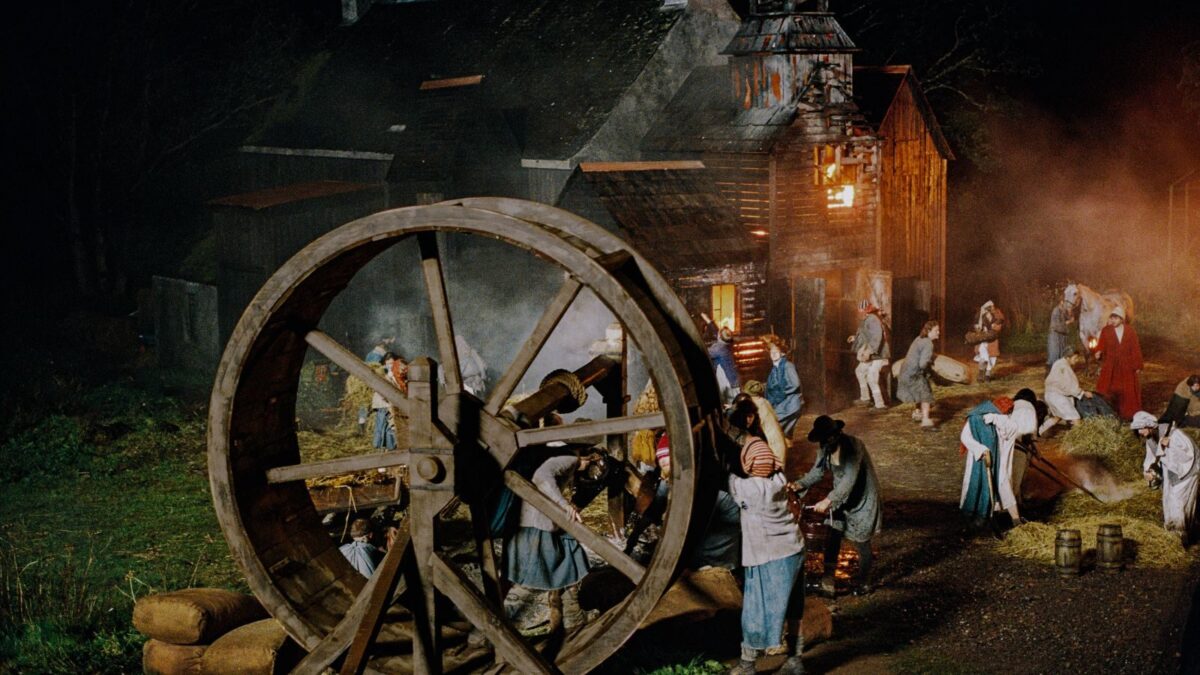
An unnamed village, an unknown time; somewhere in Britain, sometime in the Late Middle Ages, something is about to end. Athina Rachel Tsangari’s Harvest sees the twilight of an old social order, but is not mourning a paradise lost. That would be too simplistic a comparison for a filmmaker whose work has always succeeded in weaving the allegorical with the political, such as gender constructs in Attenberg or Chevalier. Nine years after the latter, the Greek director returns to feature filmmaking with an adaptation of Jim Crace’s acclaimed book of the same name, making Harvest her third film and first period piece. – Savina P. (full review)
Invention (Courtney Stephens)

Grieving comes in many guises. In Courtney Stephens’ Invention, speculative fiction blends with personal history to explore the ways we process death. The subject is Callie Hernandez, an actress and filmmaker whose father died of a COVID-related illness in 2021. There’s much archival footage of the man, mostly television recordings from his times as a kind of telemarketer for new-age healing methods, but Stephens and Hernandez go one further, suggesting an alternative timeline. In this ersatz world, a patent for an electromagnetic healing device is left to her in her father’s will. No categorization does the film justice: it’s about death and mourning, of course, but it’s just as interested in people’s susceptibility to conspiracy. – Rory O. (full review)
In Search of Gladys Glover (Gina Telaroli)

With In Search of Gladys Glover, director Gina Telaroli acts out a nightmare scenario in which she’s stalked by a blonde doppelganger. (She plays both roles.) Drawing on an eclectic range of influences––including George Cukor, David Lynch, even J-horror––it turns New York into a terrifying liminal space. Shooting on an iPhone, Telaroli creates a deeply unsettling ambience in which personal identity is up for grabs. – Steve E.
Jimmy (Yashaddai Owens)
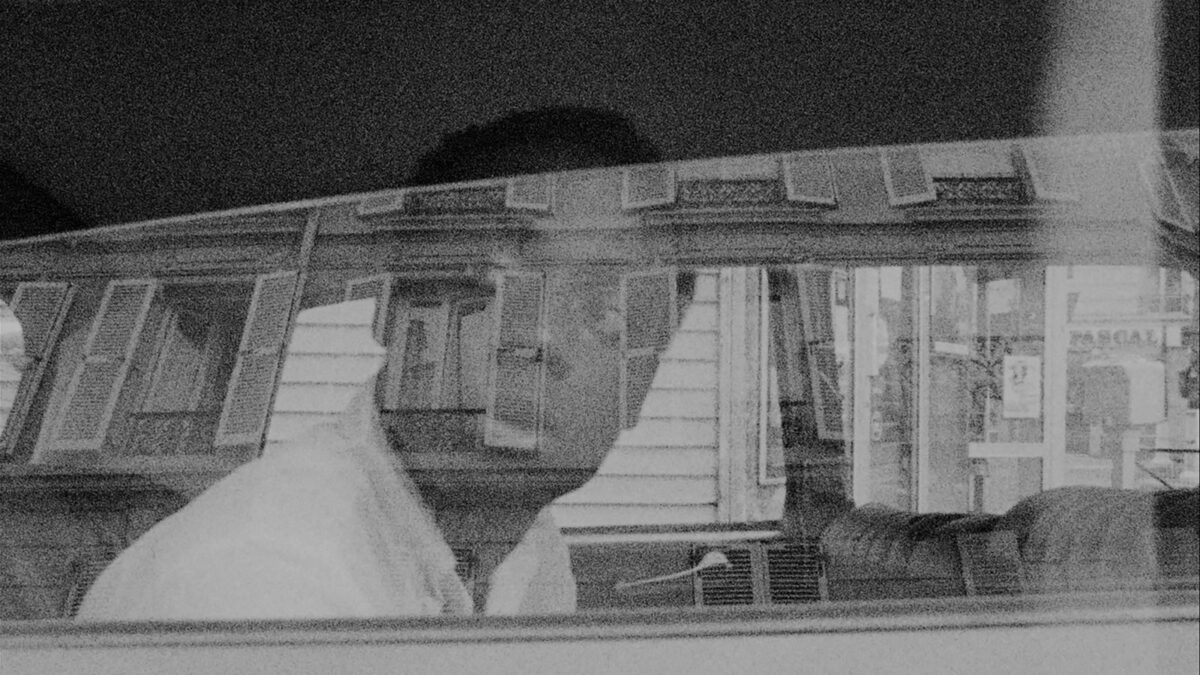
My favorite discovery in this year’s NYFF lineup was Yashaddai Owens’ jazzy, French New Wave-esque portrait imagining James Baldwin’s (Benny O. Arthur) arrival to Paris in November 1948. With a plethora of biographical dramas seemingly rinsing and repeating key moments of a famous subject’s life in a familiar fashion, Owens radically rethinks the form of the biopic, transporting us with the fresh sights and sounds of a city that would go on to shape the author’s work. Shot on grainy, evocative 16mm in black-and-white, Jimmy is a gamble that succeeds on every front. – Jordan R.
Local Legends: Bloodbath! (Matt Farley)

Is niche micro-celebrity still a form of fame? Real-life musician Matt Farley, who directs himself as a fictionalized alter ego, presents himself as a violent jerk in Local Legends: Bloodbath! It stays true to the amateur ethos he’s espoused working with director Charles Roxburgh. Yet it pokes at the notion that developing a fan base can corrupt artists, even if that base numbers in the low three figures. – Steve E.
Marianne (Michael Rozek)

50 years, 150-something films, and a stable of auteurs that beggars belief would suggest Isabelle Huppert has done it all. Hence my dual surprise: she’s only now starred in a one-woman performance, and the film showcasing such remains undistributed in any country. Making a feature debut in his 70s, former journalist Michael Rozek pulls apart and picks through the mechanics of drama, performance, and text. Who better to accompany us than Huppert? Their metatextual, near-Brechtian dialogue (shot by the great Céline Bozon) suggests a highbrow cult classic. Its lack of distribution is strange and unfortunate. – Nick N.
My Undesirable Friends: Part I — Last Air in Moscow (Julia Loktev)

Writer-director Julia Loktev––whose 13-year hiatus from filmmaking has left cinephiles in a curious stupor––has returned, and it was worth the wait. My Undesirable Friends: Part I – Last Air in Moscow marks a significant shift for the Russian-American filmmaker, whose two enigmatic fiction features from 2006 and 2011 bear no resemblance to this: a five-and-a-half hour documentary (this is only “Part I,” mind you) that follows the last independent journalists on the ground in Moscow in the days leading up to and just after Russia’s, as they describe it, “fucked-up” invasion of Ukraine. – Luke H. (full review)
No Other Land (Basel Adra, Hamdan Ballal, Yuval Abraham, Rachel Szor)

Something that’s occasionally forgotten amongst the carnage and statistics of recent events is how relentless (and calculated) the decades of conflict have been on regular Palestinian lives: the daily humiliations faced by anyone forced to pass through a checkpoint to get to work; or the endless micro and macro aggressions visited on those living near the border. The latter is what is witnessed in No Other Land, a powerful documentary premiering today at the Berlinale that follows the friendship of Basel Adra, a Palestinian activist and West Bank native, and Yuval Abraham, an Israeli investigative journalist who joins his cause. Beginning in 2019 and running all the way up to December of last year, the film provides a vital document of the erasure of Adra’s region, Masafer Yatta––an organized offensive that is described in the press notes as “the largest single act of forced transfer ever carried out in the occupied West Bank.” – Rory O. (full review)
Nothing in its Place (Burak Çevik)

Turkish director Burak Çevik’s fifth feature asks a perennial question (is there politics without violence?) and answers rather grimly, showing how in Turkey, circa the late 1970s (at least), there was no room for non-violent approaches. Nothing in Its Place, shown as part of the Proxima Competition at the Karlovy Vary International Film Festival, is visually impressive, affective, and fittingly bleak in the ways it handles ethical conundrums begetting extremism. The distorted idea of belonging its title alludes to also has a rather utopian streak: if nothing is in its place, then chaos reigns; but chaos, defined against order, can also carve space for freedom. – Savina P. (full review)
Rei (Toshihiko Tanaka)

Rei is a three-hour-plus, Tokyo-Hokkaido-set drama about Hikari, a thirty-something woman with a steady but unexciting job, an avid playgoing habit, and a concern that her life is a bit unexciting. She meets a favorite actor after attending a play with her friend, the mother of a nonverbal disabled child with a workaholic husband who rarely gets to go out. In most films it would play as a meet-cute, but Tanaka uses it to send his heroine pining for a deaf landscape photographer named Masato (played by Tanaka himself) who lives up north. Already, though, the dramaturgy stands out––the apparent narrative device precedes the lengthy conversation the two share, and whether this is set-up or just a chance to look into the lives of our central protagonist, it demonstrates Tanaka’s talent. – Forrest C. (full review)
Sanatorium Under the Sign of the Hourglass (Quay Brothers)

Timothy and Stephen Quay have developed an entirely unique style in the world of stop-motion animation: vigorously kinetic yet meticulously controlled; balletic in its interweaving of aural and visual rhythms; full of the sort of trivia and esoterica that fascinated Borges and Pessoa; and given to looped sequences of pure, sensual, cinematographic abstraction. Their latest production, Sanatorium Under the Sign of the Hourglass, which draws generously from Bruno Schulz’s novel of the same name, adds yet more stylistic oddities to the foregoing list, albeit in a more conventional, narrativized context. – Oliver W. (full review)
Savages (Claude Barras)

Eight years after My Life as a Zucchini premiered in Directors’ Fortnight en route to winning two Césars (and nabbing one Oscar nomination), Swiss director Claude Barras returns to Cannes with Savages, an emotionally resonant stop-motion fable that looks at rampant deforestation on the island of Borneo in Southeast Asia. A tight 87 minutes, Savages wastes no time tossing us directly into the action as pre-treen Kéria and her palm-oil-extractor father witness his employer’s murder of an orangutan. Despite this killing occurring off-screen, it is very distressing. The father-daughter duo act quickly to hide the lone survivor, a baby orangutan, in their bag. With this harrowing opening, Savages relays that the death and destruction at the center of its narrative will not be sugar-coated for children. – Caleb H. (full review)
Souleymane’s Story (Boris Lojkine)

Souleymane’s Story delivers a political fable with all the grit and urgency of a thriller. It follows a Guinean food-delivery driver (Abou Sangare, brilliant in his first screen role) who rides his bike through Paris’ busy streets with alarming haste. En route from client to client, he recites a script he plans to perform the next day at his asylum meeting. His pay is determined by how many jobs he completes, but a slice of those commissions are taken by the man who operates his account––and when money is needed (Souleymane remains in arrears to the man who wrote his script), he’s not always easy to pin down. Each day ticks like a time bomb, leading up to when the last bus leaves for Souleymane’s refugee shelter. Miss it and he sleeps rough. Run afoul of the delivery app’s anonymous moderators and his only source of income vanishes. Run afoul of the police and he’s on his own. – Rory O. (full review)
Suspended Time (Olivier Assayas)

The memes won’t let you forget, but 2019 was half a decade ago. That was also the year Olivier Assayas’ Wasp Network––an odd return to the realm of his TV series Carlos, and subsequently picked up by Narcos-era Netflix––premiered at the Venice Film Festival. That was Assayas’ last feature, making the intervening period (Irma Vep for HBO aside) the longest dry patch of his 38-year career. The dexterous director returns this week to the Berlinale with the aptly titled Suspended Time, a personal essay wrapped up in an effortless comedy that shows no signs whatsoever of long gestation. – Rory O. (full review)
Teki Cometh (Daihachi Yoshida)
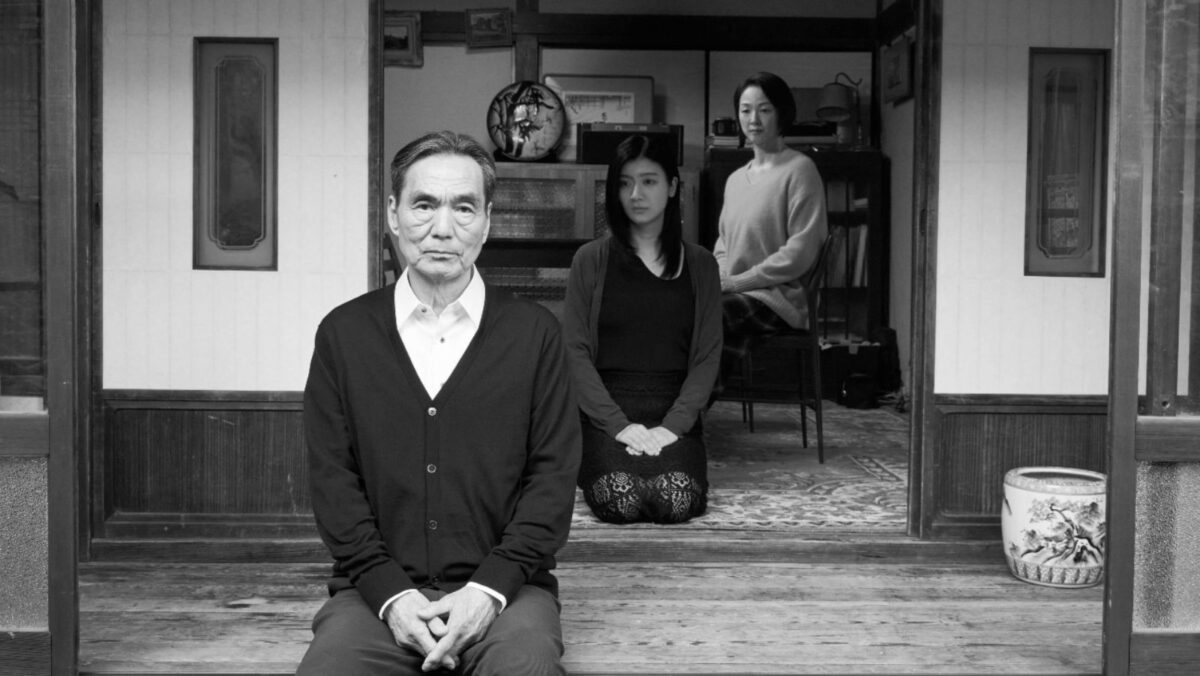
With respect to all else I saw from the Tokyo International Film Festival’s well-rounded line-up, Teki Cometh marks an easy choice for top feature. About 45 minutes pass before its inciting incident-of-sorts––a widowed, financially strained professor receives an unsigned email warning that “the enemy” is coming––preceding which is the pristine, miserable bric-a-brac assembly of its protagonist’s dull life, and from which grows mass degeneration: of logic (this has so many dream sequences that reality or fantasy become indistinguishable from shot to shot), of heretofore rigid austerity, of emotional comportment. A film convincing at either end and, like all my favorites, larger on the inside than it appears from the out. No matter that Yoshida is the longest-active director on this list by leaps and bounds––Teki Cometh was the festival’s true discovery. Any U.S. distributor seeking a sleeper hit should take note. – Nick N.
Toxic (Saulė Bliuvaitė)

It’s a shame Toxic wasn’t around for the recent excretions of body-horror discourse. Saulė Bliuvaitė’s debut feature, winner of the Golden Leopard at this year’s Locarno Film Festival, does at least as much to turn the stomach with its tablet of tapeworm eggs than either of The Substance or A Different Man‘s Faustian cures. The rub in Bliuvaitė’s film is that such a pill exists, if only for those willing to wade onto the dark web––even Googling its side effects, as the protagonist discovers, should be done with some degree of caution. The anatomical anxieties and queasy professional demands that create a market for such horrors are the subject of Bliuvaitė’s film, which follows two teenage girls living in the shadow of a Lithuanian power station whose best hope for escape––a dubiously dangled carrot of catwalk fame in Tokyo or Paris––rests on their willingness to stay matchstick-thin. – Rory O. (full review)
When the Light Breaks (Rúnar Rúnarsson)

Watching When the Light Breaks on a recent day in Thessaloniki, I spared a thought for anyone in the audience who might be wary of Gen-Z’s famed sensitivity. For a film built around a painful secret and an awful tragedy, it’s delivered with refreshingly buoyant energy, yet the thing you hear most often is the sound of a stifled sob. It follows the death of a boy, Diddi (Baldur Einarsson), and how his group of friends cope with the immediate fallout. But here’s the twist: up until his death, he has been having an affair with a girl named Una (Elín Hall, in a captivating performance) behind the back of his girlfriend Klara (Katla Njálsdóttir). So when Klara eventually arrives on the scene, understandably devastated and taking the spotlight, it’s Una who must grit her teeth and hold back those tears. – Rory O. (full review)
More Films Seeking Distribution
Before we get to a list of additional films worth having on your radar, we should note the puzzling lack of wider distribution for Wong Kar-wai’s Blossoms Shanghai, 30 episodes of which premiered around this time last year on China’s CCTV-8 and Tencent Video, but hasn’t seen the light of day elsewhere.
- Bogancloch
- The Cats of Gokogu Shrine
- Cherub
- Ick
- It Doesn’t Matter
- Jazzy
- Lazaro at Night
- Light Falls
- Mechanisms Common to Disparate Phenomena #39
- No Sleep Till
- The Other Way Around
- Panopticon
- Realm of Satan
- Sad Jokes
- The Second Act
- Secret Mall Apartment
- Sons
- Songs from the Hole
- Suburban Fury
- Super Happy Forever
- Territory
- Three Kilometers to the End of the World
- Through the Graves the Wind is Blowing
- Transamazonia
